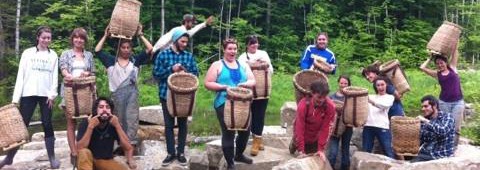
Ian and Lesley live by the philosophy of “radical hospitality” and in service to others and the earth, creating positive energy forcefield. Even in our short meeting at the Holy Donut I witnessed the universe pass good fortune through them. As the shop was closing, the owner gave us a bag of free donuts. He let us finish our meeting, but locked the door. When hopeful patrons showed up a few minutes too late, Ian unlocked the door and passed the bag to them. The natural instinct Ian and Lesley possess to share their resources and make other people’s experiences more positive is inspiring. This commitment to community and humanity is true sustainability. By living within their means, and while always focusing on giving back even more, they are doing their part to save the world. This philosophy paired with “voluntary simplicity”, a dedication to creating positive change, and sustainable initiatives, is the backbone of the Bettie the Bus Initiative.
Bettie the Bus is a sustainable educational model, service-oriented project, and lifestyle for Ian and Lesley. They created the bus to demonstrate examples of small space design and alternative energy systems. It runs on bio-diesel or raw waste vegetable oil. The vegetable oil is picked up from restaurants to re-use in the bus, when often it would be thrown out in dumpsters, as it commonly cost restaurants to dispose of the used oil. The bus incorporates solar panels and is constructed from re-purposed material. The bus has a solar panel on the roof that supplies energy for their lights, and the interior RV-like space is constructed from re-purposed material. Ian and Lesley bought the bus in 2012 and converted it, with the help of their community, into a sustainable- living model.
 Lesley teaching on the bus
Lesley teaching on the bus
Bettie the Bus took a two year trip around the country, where Lesley and Ian taught workshops on alternative energy and farming techniques such as using composting, passive solar greenhouses, organic gardening principles, and permaculture designs. Beyond workshops, the two year trip was characterized by flexibility and openness to stoping and helping others. For any reason a project had stalled, Lesley and Ian would stay to make it possible. They use their program management, facilitation, teaching, and combined skills to jump into projects, take out the road blocks, and help set up smooth systems. Their philosophy systematically empower and uplift others so they are no longer needed. Their ideal situation: ”work themselves out of a job”.
Through helping along the road they experienced an alfalfa festival in Wisconsin, worked on organic farms throughout the country, participated in beneficial trades, and gained experience with new systems and skills that they can share in future communities. Some friends referred to them as “The Pollinators” as they bring the energy, excitement, and skills to accomplishing projects wherever they go.
Lesley and Ian are also extremely involved in creating a sustainable community here in Portland. They are involved in Permaculture work days (called a permablitz), the new Tool Library, the Winter Cache Project, Portland Hour Exchange, and city Transition meetings. They are working towards funding for the Bettie the Bus Initiatives, and have a dream to organize a convergence of educational buses in the future.
Find them here to follow their work or contact them.


